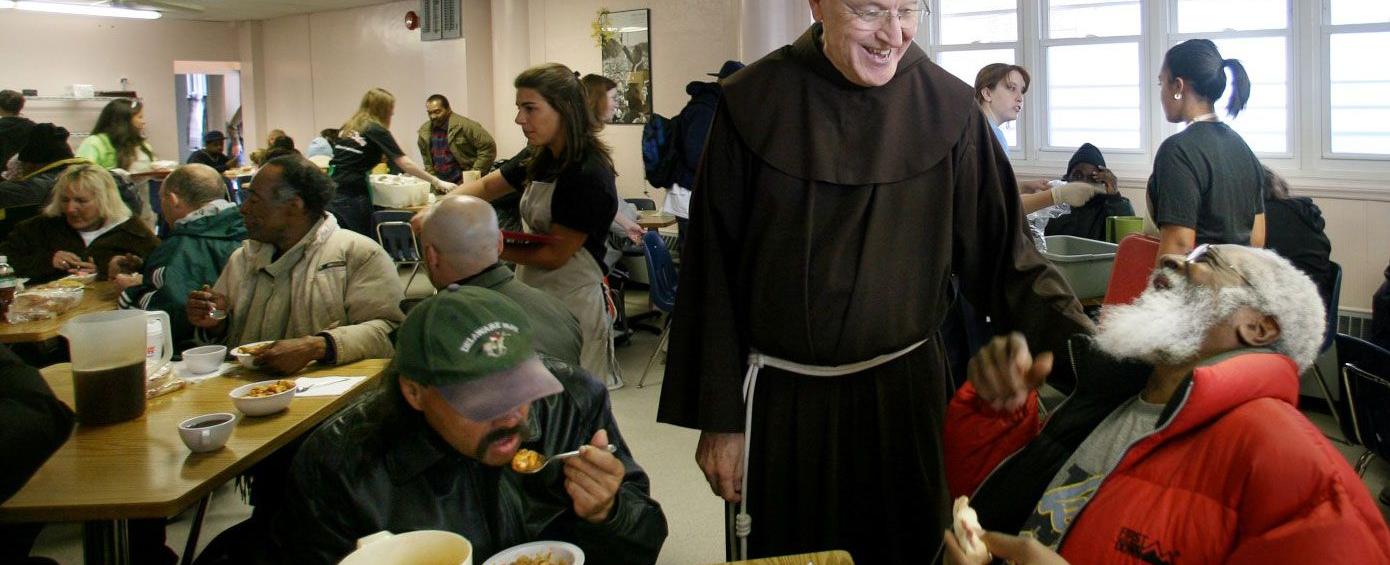Pray Like Francis: “We adore you, Lord Jesus Christ, and we bless you”

This blog continues our Lent 2021 series of reflections on the Franciscan Intellectual-Spiritual Tradition by a variety of women and men Franciscans.
In his Testament, Saint Francis of Assisi urged the friars to pray whenever they visited churches: “We adore you, Lord Jesus Christ, in all your churches throughout the whole world and we bless you because by your holy cross you have redeemed the world.”
Francis believed strongly in Jesus’ Incarnation
In the thirteenth century when many people spoke glowingly of the “spiritual Church” and extremely negatively about the “fleshy (carnal) Church,” Francis dealt with the Catholic Church as he found it. He anticipated the much later words of Oliver Cromwell, encouraging the man painting his portrait to show him “warts and all.” Because Francis believed very strongly in Jesus’ Incarnation, the Poor Man of Assisi strongly rejected the luxury of retreating into an ideal Church, all whose members were saints.
Francis was a prophet aware of his need for conversion
Francis became the leader of the friars and the inspiration for Poor Clares and Secular Franciscans, but he steadfastly resisted becoming anyone else’s conscience. As he said to the brothers toward the end of his life, “I have done what is mine; may Christ teach you yours.” In many ways, Francis was a prophet, but one acutely aware of his continuing need for conversion. He refused the luxury of standing apart from everyone else and judging their conscience. The Gospel would show him what to do next.
Francis was not blind to sin and scandal
Mark Twain perhaps unknowingly captured a very Franciscan spirit when he said, “Nothing is more enjoyable than to judge someone else’s conscience.” Although Francis was not blind to sin and scandal, he urged his followers not to become angry because of the sins of others, especially other friars. That could easily become a full-time job! It had become that for far too many of his contemporaries outside the Order.
Everyone contributes to the incarnational Church
Even though people can work up a tremendous amount of indignation these days when talking about “the institutional Church,” if you ask them to substitute the term “incarnational Church,” will their indignation reach the same level? Most unlikely. Like it or not, they know at some level that they are part of the “incarnational Church,” contributing to its glories and blemishes.
God knows there were many scandals in the Church in Francis’ day. And there are certainly plenty today! The McCarrick report issued by the Vatican last November is probably the most painful one in the lifetime of current Franciscans!
Francis took the Church as he found it
Francis of Assisi refused to explain his actions as totally dictated by the sinful choices that other people have made or may make. He would have chuckled over the New Yorker cartoon that shows two monks walking in a cloister, one saying to the other, “I could be a saint if I really wanted to.”
For some reason, many of us are willing to put our individual lives “on hold” until everyone else cleans up his/her/their act. Francis of Assisi took the Church as he found it, never blind to the sins of its many members or the holiness all around him. He would have understood and strongly supported Pope Francis’ expression “next-door saints.”
Small contributions are precious in God’s eyes
The Poverello strongly encouraged his followers to clean up churches physically and to ensure that the Blessed Sacrament and the Scriptures were reserved reverently. Clare of Assisi embroidered purificators and corporals for churches near Assisi. Secular Franciscans fed the hungry, sheltered the homeless, worked to alleviate the suffering of people suffering from leprosy, and engaged in every possible corporal and spiritual work of mercy—never with the assurance that their best efforts would be enough to wipe out these and other pressing human needs. They did these things always with the confidence that their small contributions are precious in God’s eyes.
Francis saw the need to give good example
In all of this, vowed Franciscans and admirers of Francis have been mindful over the centuries of our need to give the good example that God rightly expects of us. The “We adore you, Lord Jesus Christ, and we bless you” prayer has kept them focused both on current needs and the heavenly banquet “where God will be everything in all of you,” as Saint Paul wrote.
Francis placed trust in daily conversion
Francis of Assisi knew all about “branding” before it became as important as it is today. He placed his trust not in slogans, vision statements, and long-range plans but rather in the daily conversion that will render God’s ways more and more normal in our lives.
He might ultimately ask, “How could we not?”
-----
Photo by Br. Octavio Duran, OFM, of Fr. Michael Duffy, OFM, at St. Francis Inn in Philadelphia. Courtesy of Holy Name Province.Pat McCloskey, OFM
Editor of St. Anthony Messenger
Pat McCloskey, OFM, Franciscan editor of St. Anthony Messenger, has an MA in Franciscan studies. Peace and Good: Through the Year with Francis of Assisi (Franciscan Media) is his latest book.

